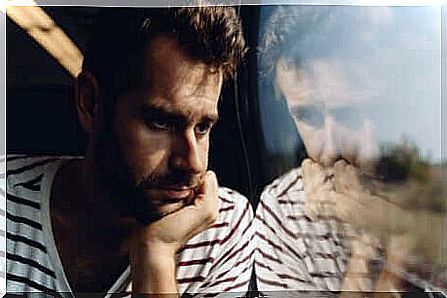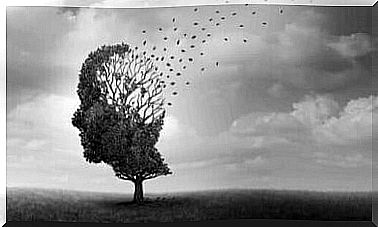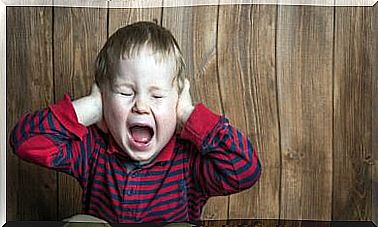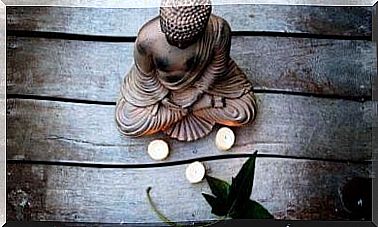Affective Ambivalence: Wanting And Having To

We all suffer from emotional ambivalence at some point in our lives because we are complex beings full of emotions, feelings and contradictions. It is a state in which it is possible to feel both joy and sadness, as well as love and hate a person at the same time.
Have you ever loved someone and felt a tremendous resentment towards the way they treated you? Have you felt joy at seeing a loved one and at the same time sadness because of their behavior?
Affective ambivalence is part of the emotional range of the human being. To a fair extent, ambivalence is seen as adaptive, as feeling opposite emotions helps us make decisions about doubts we have and deal with situations that generate conflict.
However, living full of contradictions and doubts generates anxiety and discomfort. What makes us feel emotional ambivalence? What is the origin of the opposing emotions? Are we really aware of the reasons that make us feel this way? Do family models and our family learning influence us?
These questions highlight the enormous emotional complexity of human beings. This is what Daniel Goleman highlights in his theory of emotional intelligence.

The concept of ambivalence
Bleuer was the first to adopt this term in 1911 to designate the state of mind in which two opposing emotions coexist, such as love and hate. Affective ambivalence refers to a state of conflicting emotions in which opposing thoughts and / or emotions are felt simultaneously. It’s an unpleasant feeling.
Where does emotional ambivalence come from?
We assume that our way of feeling and thinking is associated with our knowledge of the world, with the way we experience it. Serge Moscovici, in his theory of representations, explains that our behavior is governed by a code with which we classify everything that happens to us. We give meaning to everything we experience.
Likewise, according to the systemic current, the way we experience what surrounds us is influenced by an essential factor: the family. The family system gives us certain information about the world and how to behave in it, consciously or unconsciously.
We can thus affirm that our way of relating to our emotions and our thoughts is strongly linked to two fundamental elements. On the one hand, the family system and, on the other hand, our own beliefs based on our own knowledge of what surrounds us.
The family system, a key factor
According to Salvador Minuchin, the family is a system formed by a network of relationships which in turn constitute other subsystems. It is conceived as a whole different from the sum of its parts, which goes through a life cycle during which it evolves through different stages to which the system adapts.
Each family involves certain norms, rules, models, limits and hierarchies which determine its suitability and functionality. A model is made up of three domains: the thought of the world, the emotion associated with this thought and, finally, the behavior that we adopt through the two preceding domains.
Therefore, the education received in our family system inherently transmits certain habits and beliefs to which we are accustomed. It shapes our development.
Family defines us
Standardized behaviors vary from family to family. For example, in a family, dinner is at a certain time with the whole family around the same meal; in another, each member dines at his time and eats what he wants. You have most certainly observed models different from yours.
“I’m not clear on what I want and what they expect from me”
What do I want? We have certainly all asked ourselves this question at some point. Likewise, we ask ourselves what is expected of us. Throughout our lives, we develop our knowledge of the world and make decisions. We decide, for example, what we want to be, where to live, who to love.
Conflict arises when what we want contradicts the preconceptions of our family models. In other words, what we thought was the right thing to do may no longer be.
You have learned that at this point you have to follow an instilled belief that until recently was yours and no longer belongs to you. On the one hand, you think you have to do it. On the other hand, a part of you says no and you feel in a continuous contradiction.

Living in constant contradiction
Contradictions paralyze us because they generate great emotional discomfort. Feeling ambivalent upsets our psychological balance. The wear produced is of great magnitude. We feel blocked and overwhelmed by these feelings. Being constantly indecisive wears us out, affecting our self-esteem and our state of mind.
Life is full of decisions, and it’s common to feel fear and stress about some of them. When this unease comes over us, we block ourselves.
What should I do if I am emotionally ambivalent?
- Say STOP. We have to listen to ourselves to understand what is happening to us. What happens to us to feel this? What situation do we find ourselves in?
- Think about the origin of these doubts. Thinking about the origin of the doubts we have can be the way to clarify them.
- Become aware of your reality, of the best decisions for you to make. Weigh what you want and what you don’t want. Being aware of what is happening to us is the best way to define and accept certain situations.
- Manage your emotions, try to identify them. What am I feeling? What should I do with this feeling? Identify your emotions to channel them correctly, because handling them wrongly increases how we feel.
- Express what you are feeling, seek help in your surroundings. Tell people around you what is happening to you. Communicating what worries us to release all that anxiety we are feeling can help us erase all the unknowns.
As Goleman said, “Each emotion predisposes us to action in a different way. Each of them indicates to us a direction which, in the past, has enabled us to adequately resolve the innumerable challenges to which human existence has been subjected ”. This is why even emotional ambivalence must be heard and managed.










